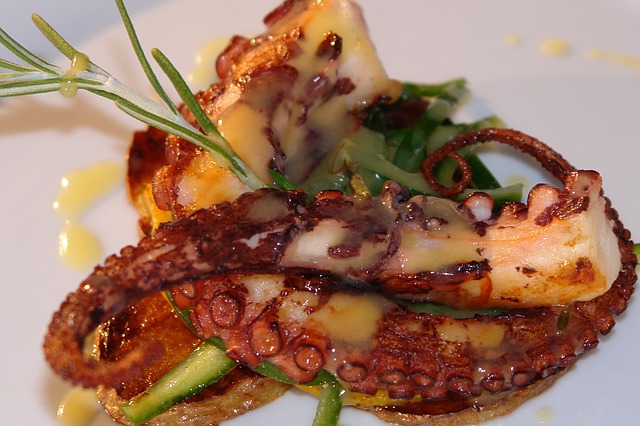Have you ever had leftover cooked octopus and wondered if you can freeze it? Freezing is a way to keep food fresh longer. But, it works better for some foods than others.

It’s important to know how to store and reheat cooked octopus right. This keeps it tasty and safe to eat. Whether you love seafood or just enjoy it sometimes, learning about freezing and reheating is key.
Key Takeaways
- Freezing cooked octopus is a good way to keep it fresh.
- Storing it right is key to keeping it good.
- How you reheat it can change its taste and feel.
- It’s important to follow food safety rules.
- Freezing can change the octopus’s texture.
The Versatility of Cooked Octopus
Cooked octopus is a great ingredient for many dishes. It’s good in salads, appetizers, and main courses. Its taste and soft texture are loved by many.
Why Octopus Has Become Popular in American Cuisine
Octopus is now a hit in American food because of its taste. People are trying new recipes with it. It’s used in dishes from around the world.
Common Challenges with Octopus Leftovers
Storing cooked octopus can be tricky. It can get tough if not stored right. Freezing is a good way to keep it, but you need to do it carefully.
Can You Freeze Cooked Octopus?
Wondering if you can freeze cooked octopus? The answer is yes, but you need to know the science. Freezing is a way to keep cooked octopus fresh and tasty.
The Science Behind Freezing Seafood
Freezing seafood like octopus stops bad stuff from growing. It also stops changes that can make it go bad. This method keeps the octopus’s texture and taste good.
Freezing changes the octopus’s cells. Ice crystals form, which can hurt the texture. But, if you freeze it fast, the ice crystals are smaller. This helps keep the octopus firm.
| Freezing Method | Effect on Texture | Effect on Flavor |
|---|---|---|
| Slow Freezing | Texture becomes softer | Flavor may become less vibrant |
| Rapid Freezing | Texture remains firmer | Flavor is better preserved |
How Freezing Affects Octopus Texture and Flavor
Freezing cooked octopus can change its texture and taste. The change depends on how you freeze it and where you store it. Rapid freezing keeps the octopus firm. Slow freezing makes it softer.
The taste of cooked octopus can also change when frozen. Storing it in airtight containers or bags helps keep the flavor. This prevents freezer burn.
Benefits of Freezing Cooked Octopus
Freezing cooked octopus keeps it fresh longer. It also makes planning meals easier. This simple trick can change how you enjoy seafood every day.
Extended Shelf Life and Reduced Food Waste
Freezing cooked octopus makes it last longer. This helps you use leftovers or buy in bulk. You can then use it in many dishes, like salads or pasta.
Some ideas for using frozen cooked octopus include:
- Adding it to a Mediterranean salad with olives and feta
- Using it as a topping for sushi or sashimi
- Incorporating it into a seafood paella
Convenience for Meal Planning and Batch Cooking
Having frozen cooked octopus makes meal planning easy. You can thaw and use it in many recipes. This is great for those who like to cook in bulk or plan meals early.
For example, mix frozen cooked octopus with onions, capers, and lemon juice for a tasty appetizer. The trick is to store it well so it’s always ready.
Preparing Octopus for Freezing
When you freeze cooked octopus, you need to do a few things first. This keeps its taste and texture good. It also makes sure it’s safe to eat later.
Cooling Properly Before Freezing
First, cool the octopus down. Put it in a shallow metal pan or a big plate. Then, chill it until it’s 40°F (4°C) or colder in two hours. This step stops bad bacteria from growing.
Portioning for Convenient Use
After cooling, cut the octopus into parts you can use. This makes thawing and using it easier. You can put it in small containers or freezer bags.
Removing Excess Moisture
Next, dry the octopus well. Use paper towels to soak up extra moisture. This step stops ice crystals from ruining the octopus’s texture when thawed.
By doing these steps, your cooked octopus will be ready to freeze. It will stay tasty and safe for your next meal.
Best Containers and Wrapping Methods
Storing cooked octopus right is key to keeping it fresh. You need to pick the best containers or wrapping. This helps avoid freezer burn and keeps the octopus tasty and tender.
Airtight Containers vs. Freezer Bags
You can store cooked octopus in airtight containers or freezer bags. Airtight containers are great for big portions and can be used again. Freezer bags are flexible for all sizes and save space in your freezer.
Vacuum Sealing for Optimal Results
Using a vacuum sealer is the best choice. It removes air, cutting down freezer burn risk. This keeps the octopus’s flavor and texture perfect for a long time.
Double-Wrapping Techniques for Extra Protection
Double-wrapping adds extra safety. Wrap the octopus in plastic or foil, then in a bag or container. This keeps it fresh and untouched by other tastes.
Choosing the right storage keeps your cooked octopus fresh. You can enjoy it later without losing its quality.
Step-by-Step Freezing Process
Freezing cooked octopus is easy. You just need to know a few things to keep it good. This way, you can enjoy it later without losing its taste or texture.
Labeling and Dating Your Packages
First, label and date your packages right. This helps you use the oldest items first. It also keeps track of how long they’ve been stored. Use a permanent marker to write the date and what’s inside.
For example, you might write “Cooked Octopus – Frozen on [Date].” This keeps your freezer tidy.
Flash Freezing Technique
Flash freezing quickly freezes the octopus. This keeps its texture and flavor good. To do this, put the cooked octopus on a baking sheet lined with parchment paper.
Make sure the pieces don’t touch each other. Then, put the sheet in the freezer until it’s solid. After that, move it to airtight containers or freezer bags. This stops ice crystals from damaging the octopus.
Proper Freezer Placement and Organization
After freezing, store the octopus in the coldest part of your freezer. This is usually at the bottom or back. Keep similar items together and put older items at the front.
This keeps your frozen foods fresh and prevents freezer burn. By following these steps, you can freeze cooked octopus well. This way, you can enjoy it in many dishes later.
Whether you’re making frozen octopus recipes or storing leftovers, proper freezing is key. It helps keep the octopus’s quality.
How Long Can You Store Frozen Cooked Octopus?
Many people wonder how long frozen cooked octopus lasts. Freezing is a great way to keep it fresh. But, knowing what affects its shelf life is key.
Optimal Freezer Temperature Settings
Keeping your freezer at 0°F (-18°C) or below is important. This temperature helps keep the octopus’s texture and taste good.
Quality Timeline: 1 Month vs. 3 Months
The quality of frozen cooked octopus changes with time. It can last for months, but its quality might drop. Here’s how it compares at 1 month and 3 months:
| Storage Duration | Texture | Flavor |
|---|---|---|
| 1 Month | Firm, tender | Rich, seafood flavor |
| 3 Months | Slightly softer | Flavor may be slightly muted |
Signs of Freezer Burn and Spoilage
Frozen cooked octopus can get freezer burn or spoil. Look for color, texture, or smell changes. If you see these signs, it’s best to throw it away.
By following the right storage tips, you can enjoy your octopus longer. And it will stay tasty and fresh.
Thawing Frozen Octopus Safely
When you’re ready to use your frozen cooked octopus, thaw it safely. This keeps its texture and flavor good. Safe thawing stops bacteria growth and keeps the seafood quality high.
Refrigerator Thawing Method
Thawing in the fridge is safe. Put the octopus in a bag or covered dish on the middle or bottom shelf. This slow method keeps it safe from bacteria.
Cold Water Thawing Method
For quicker thawing, use cold water. Put the octopus in a bag and soak it in cold water. Change the water every 30 minutes to stay cold. This method is quicker but needs more watching.
What Not To Do When Thawing Seafood
Don’t thaw octopus at room temperature or in hot water. These ways let bacteria grow fast. Never thaw in warm or lukewarm water. Always thaw in the fridge, cold water, or the microwave’s defrost setting for seafood.
Follow these safe thawing steps. You’ll enjoy your frozen cooked octopus while keeping it safe and tasty.
Delicious Ways to Use Thawed Cooked Octopus
Thawed cooked octopus is very versatile. You can use it in cold salads or hot meals. It’s up to your creativity.
Cold Octopus Salads and Appetizers
Cold octopus salads are great for hot days. Just chop the octopus and mix it with greens, tomatoes, and citrus dressing.
Hot Dishes and Reheating Techniques
To make hot dishes, reheat the octopus in a tasty broth. This keeps it tender and flavorful.
Mediterranean and Asian-Inspired Recipes
Mediterranean and Asian dishes are perfect for octopus. Marinate it in olive oil, lemon, and herbs. Or stir-fry it with soy sauce and ginger.
Incorporating into Pasta, Rice, and Soups
Octopus is great in pasta, rice, and soups. Just chop it and add it to your favorite recipes. Try it with linguine and garlic, or in a seafood soup.
| Dish Type | Ingredients | Preparation Method |
|---|---|---|
| Cold Salad | Octopus, mixed greens, cherry tomatoes, citrus vinaigrette | Chop octopus, combine with ingredients, serve chilled |
| Hot Dish | Octopus, broth or sauce, herbs | Reheat octopus in broth or sauce, serve hot |
| Pasta | Octopus, linguine, garlic, herbs | Toss cooked octopus with linguine, garlic, and herbs |
Conclusion
You now know how to freeze cooked octopus. This keeps it fresh for months. It’s great for saving food and planning meals ahead.
It’s key to cool and portion the octopus well. Use airtight containers or bags. Label them so you know what’s inside. This way, your octopus stays fresh for a long time.
Thawing it safely is important. You can use it in many dishes, like salads or hot meals. Freezing cooked octopus is a smart choice for seafood lovers and those looking for sustainable food options.
FAQ
Can you freeze cooked octopus?
Yes, you can freeze cooked octopus. Freezing helps keep it fresh for longer.
How do you store cooked octopus in the freezer?
Cool the octopus first. Then, cut it into parts for easy use. Remove extra moisture. Put it in airtight containers or bags.
What is the best way to thaw frozen cooked octopus?
Thaw it in the fridge or with cold water. Don’t thaw at room temperature to avoid bacteria.
How long can you store frozen cooked octopus?
You can store it for months. The exact time depends on your freezer and the octopus’s quality.
Can you refreeze thawed cooked octopus?
Refreezing is not the best idea. It can make the octopus tough and less tasty. Cook it first if you must refreeze.
What are some delicious ways to use thawed cooked octopus?
Use it in salads, hot dishes, and in Mediterranean or Asian recipes. It’s great in pasta, rice, and soups too.
How do you prevent freezer burn when freezing cooked octopus?
Wrap it tightly in containers or bags. Vacuum sealing or double wrapping helps even more.
Can you freeze cooked octopus with other ingredients?
Yes, you can freeze it with veggies or grains. Just make sure everything is ready and stored safely together.
